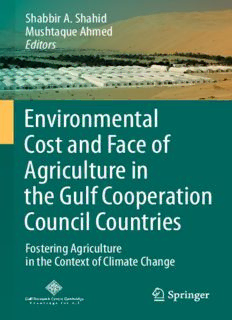
Environmental Cost and Face of Agriculture in the Gulf Cooperation Council Countries: Fostering Agriculture in the Context of Climate Change PDF
Preview Environmental Cost and Face of Agriculture in the Gulf Cooperation Council Countries: Fostering Agriculture in the Context of Climate Change
Shabbir A. Shahid Mushtaque Ahmed Editors Environmental Cost and Face of Agriculture in the Gulf Cooperation Council Countries Fostering Agriculture in the Context of Climate Change Environmental Cost and Face of Agriculture in the Gulf Cooperation Council Countries Shabbir A. Shahid (cid:129) Mushtaque Ahmed Editors Environmental Cost and Face of Agriculture in the Gulf Cooperation Council Countries Fostering Agriculture in the Context of Climate Change Editors ShabbirA.Shahid MushtaqueAhmed SoilManagementProgram,Research DepartmentofSoils,Water andInnovationDivision andAgriculturalEngineering InternationalCenterforBiosaline CollegeofAgriculturalandMarineSciences Agriculture SultanQaboosUniversity Dubai,UnitedArabEmirates Oman ISBN978-3-319-05767-5 ISBN978-3-319-05768-2(eBook) DOI10.1007/978-3-319-05768-2 SpringerChamHeidelbergNewYorkDordrechtLondon LibraryofCongressControlNumber:2014942259 ©GulfResearchCentreCambridge2014 All rights reserved. No part of this publication may be reproduced, stored in a retrieval system, or transmittedinanyformorbyanymeans,electronic,mechanical,photocopying,recordingorotherwise, withoutthepriorwrittenpermissionoftheGulfResearchCentreCambridge. Disclaimer: The opinions expressed in this publication are those of the authors alone and do not necessarilystateorreflecttheopinionsorpositionoftheGulfResearchCentreCambridge. Coverimagecaption:ProtectedagricultureisgainingimportanceinGulfCooperationCouncil(GCC) countries.Thisphotoillustratesfarmersmakingagradualshiftfromopenfieldagriculturetoprotected agriculture(PhotographcourtesyofJohnA.Kelley,USDA-NRCS). Printedonacid-freepaper SpringerispartofSpringerScience+BusinessMedia(www.springer.com) Foreword The2008globalfoodcrisisandthesudden increaseincommodityprices brought theissuesoffoodsecurityandsustainabilityoffoodproductiontotheforefrontin the Gulf region. Despite the issue having always lingered somewhere in the background, the fact that the GCC countries import more than 70 % oftheir food requirementswassuddenlythrustforwardasahigh-prioritynationalsecurityissue withgovernmentsintheregionscramblingtoformulatenationalstrategiesandfood security plans. Included in this flurry of activity sweeping the region were announcements of multi-billion dollar investments abroad in an attempt to ensure food supplies and provide for long-term food security. However, many of these investments have failed to come about due to a variety of political and economic factors.Assuch,foodsecurityremainsasubjectofconcernfortheregion. In the Gulf, water scarcity is pronounced and dependence on food imports continues to grow for which there are no easy solutions. Moreover, it must be understoodthattheissueoffoodsecurityiscloselyintertwinedwithahostofother challenges confronting the Gulf region including climate change, reliance on hydrocarbonincome,politicalinstabilities,andrisingpopulationgrowthincluding thecontinuedrelianceonalargeexpatriateworkforce.Allthesefactorscombineto makeagricultureproductionintheregionatopicofcurrentrelevance. This volume is the result of a workshop entitled “Environmental Cost and ChangingFaceofAgricultureintheGulfStates”organizedwithintheframework ofthe2012GulfResearchMeetingheldfromJuly11–14,2012attheUniversityof Cambridge. The workshop brought together participants from a wide variety of backgrounds and geographical locations in an effort to better understand the challenges the Gulf region faces when it comes to food production and how to bridgethegapbetweenlocalproductionandfoodimports.Thebookhighlightsnot onlytheprospectsofagricultureintheregionbutlooksatthepotentialofclimate- smart agriculture, improvedwater use efficiency, the use oftreatedwastewater as wellasissuesofagriculturalresearchanddevelopment. The Gulf Research Centre Cambridge is grateful to Dr. Shabbir A. Shahid, Senior Scientist at the International Center for Biosaline Agriculture (ICBA) in Dubai, UAE, and Dr. Mushtaque Ahmed from Sultan Qaboos University in the v vi Foreword SultanateofOmanforhavingtakenonthetaskofdirectingthisworkshopandthen followingtheworkthroughtothispublication.Aspecialthanksisalsoextendedto all those who presented papers at the workshop and thus added to our knowledge about this important topic for the Gulf region. It is through such work that we hopetoenlightenthepolicydebateandcontributetofurtherunderstandingsomeof thechallengesfacedbytheregion. Chairman Dr.AbdulazizO.Sager GulfResearchCentreCambridge Message Worldwidethemainissueshamperingfoodsecurityarewater/landavailabilityand thefooddistribution.Thenumbersareworrisome:870millionpeoplearehungry; everyyearabout12millionhectaresworldwidearelosttolanddegradation,andthe rate is increasing exponentially. Further, based on the World Economic Forum, water supply is among the top five global risks by likelihood and impact and the GCCisthemostwater-scarceregionintheworld. Studieshaveshownthattoincreasetheworldproductionby2050,wewillhave toincreaseagricultureproductioninmarginalenvironments.Andtodoso,weneed innovativetechnologiesandideastousewiselyallavailableresources.TheInter- nationalCenterforBiosalineAgriculturehasworked,overthelast14years,closely with several GCC countries to increase local agriculture production and develop National agriculture and food security strategies. Over the last year, ICBA went through a participatory strategy review and development exercise (including a foresight symposium) which resulted in a new strategy emphasizing innovative research, partnership and impact. We, at ICBA, aim at working with partners to deliveragriculturalandwaterscarcitysolutionsinmarginalenvironments. This book is a good illustration of joint efforts between Gulf Research Centre Cambridge,SultanQaboosUniversity,andICBA.IwouldliketocongratulateGulf ResearchCentreCambridgefororganizingthe“EnvironmentalCostandChanging FaceofAgricultureintheGulfStates” workshopandDrs.ShabbirA.Shahidand MushtaqueAhmedforconductingtheworkshopandeditingthisimportantbook. DirectorGeneral IsmahaneElouafi InternationalCenterforBiosalineAgriculture Dubai,UnitedArabEmirates vii Message Iampleasedtoknowaboutthepublicationofthisbookhighlightingtheenvironmental costs and the changing face of agriculture in the GCC countries. Agriculture faces serious challenges in the GCC countries due to water shortage, arid condition, poor soil,climatechangeeffectsandvariousotherreasons.Agricultureplaysanimportant role in Oman as large number of Omanis are engaged in agricultural activities. Agriculture in Oman is also the largest consumer of water resources (more than 90%).Assuchthereisaneedforresearchtoensurepartialself-sufficiencyofsome cropsandattainfoodsecurityinOmanwithoutharmingtheenvironment.Thefaculty and staff of the College of Agricultural and Marine Sciences of Sultan Qaboos UniversityareengagedinresearchtotackleproblemsofOmaniagricultureandhave made enormous contribution in broadening the knowledge base on different issues relevanttoGCCagriculture.Thisbookwillhelpindisseminatingsuchknowledgetoa wideraudience. I congratulate Gulf Research Centre Cambridge (GRCC) and the editors for publishingthisbookwhichwillbeofinterestnotonlytotheagriculturalscientists butalsotothedecisionmakersofthisregion. DeputyVice-Chancellor–Postgraduate Prof.AmerAliAl-Rawas StudiesandResearch SultanQaboosUniversity Muscat,SultanateofOman ix
Description: